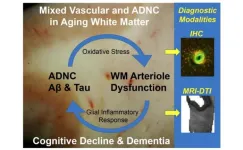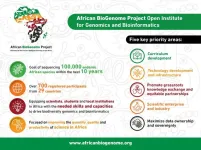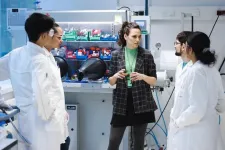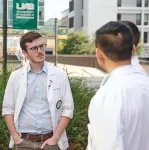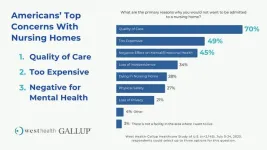(Press-News.org) The National Institute of Allergy and Infectious Diseases has awarded the Icahn School of Medicine at Mount Sinai a five-year, $13 million grant to bring together experts from multiple disciplines across five research institutions to create better vaccines against current as well as emerging coronaviruses.
The COVID-19 pandemic, caused by severe acute respiratory syndrome-related coronavirus 2 (SARS-CoV-2), has infected 280 million people and caused more than five million deaths worldwide since late 2019. While considerable progress has been made to develop interventions (i.e., monoclonal antibodies, antivirals, vaccines) to treat and prevent COVID-19, the continued emergence of viral variants with increased transmissibility and resistance to antibody neutralization highlights the urgent need for continued research into the correlates of long-lasting immune protection to design the next generation of pan-coronavirus (universal coronavirus) vaccines.
The “Programming Long-lasting Immunity to Coronaviruses” (PLUTO) project will be led by Viviana Simon, MD, PhD, Professor of Microbiology; Pathology, Molecular and Cell-Based Medicine; and Medicine (Infectious Diseases) at the Icahn School of Medicine at Mount Sinai, and Ali Ellebedy, PhD, Associate Professor of Pathology and Immunology, Medicine and Molecular Microbiology at Washington University School of Medicine in St. Louis. PLUTO researchers will figure out what makes our immune response strong and long-lasting against coronaviruses. The team will then develop vaccines that offer broad protection against existing and future SARS-CoV-2 variants, as well as pandemic, zoonotic (those that can jump from animals to humans), and seasonal coronaviruses responsible for other illnesses.
"Our multidisciplinary team is poised to tackle the challenges posed by coronaviruses head on,” said Dr. Simon. “By pooling our expertise and resources, we aim to develop next-generation coronavirus vaccines with broad protection, thus contributing significantly to curbing the current pandemic and averting future coronavirus-related public health crises.”
The long-term goal of PLUTO is to develop variant-proof, universal vaccines that protect against many different coronaviruses in a long-lasting manner. Such vaccines will help curb the current SARS-CoV-2 variants and reduce the risk of future pandemics associated with different coronaviruses.
To achieve its ambitious research agenda, the PLUTO program has assembled a team of investigators with extensive expertise in virology, immunology, pathogenesis, universal vaccine development, and structural biology who have a well-established track record of successful collaborations.
To understand the interplay between an evolving viral pathogen and the host antibody responses at the cellular, molecular, and structural levels, the team will leverage an exceptional set of biological specimens. Those specimens include longitudinal blood samples from vaccinated and boosted individuals who were infected with recent SARS-CoV-2 variants such as Omicron, or seasonal coronaviruses; longitudinal samples from blood, draining lymph nodes, and bone marrow from individuals who received first-generation SARS-CoV-2 mRNA vaccines as well as those who received mRNA vaccines that are based on the recent Beta and Delta variants. This will allow for an in-depth characterization of responses by B cells, a type of specialized immune system cells.
Under PLUTO, two complementary research projects will establish correlates of robust, durable, and protective coronavirus humoral immunity (Project 1) and design and test efficacy of viral variant-proof pan-sarbecovirus and pan-betacoronavirus vaccines (Project 2). To support the successful completion of the research aims, several core groups will synergize the two research projects.
“Outbreaks of emerging and re-emerging viral pathogens will continue to threaten world health, but the PLUTO program project will lead to solutions to minimize waning immunity and prevent decreased protection against these threats,” said Dr. Simon.
“The assembled team has a track record of success in designing these types of broadly protective universal vaccines, bringing universal influenza vaccine candidates into clinical development. Using the same methods and strategies, we are confident that our PLUTO efforts will result in similar successes,” adds Dr. Ellebedy.
About the Mount Sinai Health System
Mount Sinai Health System is one of the largest academic medical systems in the New York metro area, with more than 43,000 employees working across eight hospitals, more than 400 outpatient practices, more than 300 labs, a school of nursing, and a leading school of medicine and graduate education. Mount Sinai advances health for all people, everywhere, by taking on the most complex health care challenges of our time—discovering and applying new scientific learning and knowledge; developing safer, more effective treatments; educating the next generation of medical leaders and innovators; and supporting local communities by delivering high-quality care to all who need it.
Through the integration of its hospitals, labs, and schools, Mount Sinai offers comprehensive health care solutions from birth through geriatrics, leveraging innovative approaches such as artificial intelligence and informatics while keeping patients’ medical and emotional needs at the center of all treatment. The Health System includes approximately 7,400 primary and specialty care physicians; 13 joint-venture outpatient surgery centers throughout the five boroughs of New York City, Westchester, Long Island, and Florida; and more than 30 affiliated community health centers. Hospitals within the System are consistently ranked by Newsweek’s® “The World’s Best Smart Hospitals” and by U.S. News & World Report's® “Best Hospitals” and “Best Children’s Hospitals.” The Mount Sinai Hospital is on the U.S. News & World Report's® “Best Hospitals” Honor Roll for 2023-2024.
###
END
In the ever-perilous autoimmune disease world of systemic lupus erythematosus (SLE or lupus), up to 60% of adult patients and 80% of children will develop lupus nephritis (LN), and up to half of those will move on to end-stage renal disease. LN occurs when the immune system wrongly attacks the kidneys, preventing them from doing their job, i.e., cleaning blood, balancing body fluids and controlling hormones that impact blood pressure.
Unfortunately, the most precise way to diagnose LN hasn’t been ...
“The molecular mechanisms that mediate enhanced dysfunction of white matter parenchymal arterioles when vascular dysfunction and ADNC coincide remain elusive.”
BUFFALO, NY- September 12, 2023 – A new editorial paper was published in Aging (listed by MEDLINE/PubMed as "Aging (Albany NY)" and "Aging-US" by Web of Science) Volume 15, Issue 16, entitled, “Microvascular contributions to white matter injury in Alzheimer’s disease.”
In their new editorial, researchers Zsolt Bagi, ...
Since its inception in 2021, the African BioGenome Project (AfricaBP), has made significant gains towards its ambitious goal of sequencing 100,000 endemic African species within the next 10 years. Recently, AfricaBP reported the successful implementation of the Open Institute in the journal Nature Biotechnology (https://rdcu.be/dlXYT), a pioneering biodiversity genomics and bioinformatics knowledge exchange programme.
The AfricaBP Open Institute’s framework will establish openly accessible workshops across Africa, crafted in close collaborations with local African Institutions. ...
The Institute of Science and Technology Austria (ISTA) is offering science journalists the opportunity for a paid three-month "Journalist in Residence“ program starting in April 2024. Applications are open until Oct. 31, 2023.
The Institute of Science and Technology Austria (ISTA) in Klosterneuburg – in the immediate vicinity of Vienna – is a Ph.D.-granting research institute. Opened in 2009, the Institute is dedicated to basic research in the natural sciences, mathematics and computer sciences. It has a total of 1000 employees and 75 different research ...
An article published in NPJ Aging, a Springer Nature journal, reveals that natural production of auto-antibodies increases with age and that infection by SARS-CoV-2 can exacerbate production of auto-antibodies relating to auto-immune diseases, helping to explain why aging increases the chances of developing severe COVID-19. The study also discovered some of the factors that associate the severe form of the disease with blood clotting disorders such as thrombosis.
“These findings open the door to a better ...
BIRMINGHAM, Ala. – In the summer of 2018, graduate student Hunter Dean from the Medical Scientist Training Program came to Yuhua Song, Ph.D., with a research idea. He wanted to pursue his doctoral research at the University of Alabama at Birmingham in Alzheimer’s disease — under the joint mentorship of Song, who had never worked in Alzheimer’s, and Erik Roberson, M.D., Ph.D., an Alzheimer’s expert in the UAB Department of Neurology and the Center for Neurodegeneration and Experimental Therapeutics, or CNET.
That collaboration brought Song, a professor in the UAB Department of ...
Today, the National Comprehensive Cancer Network® (NCCN®)—an alliance of leading cancer centers—presented new recommendations for screening and addressing health-related social needs (HRSN) in people with cancer during a policy summit in Washington, D.C. The event included a keynote address from Ellen Lukens, Deputy Administrator and Director, The Center for Medicare and Medicaid Innovation (CMMI), and other speakers representing a diverse group of patient advocates, providers, and policymakers.
The new recommendations for measuring and addressing HRSNs were ...
WASHINGTON, D.C. — September 12, 2023 — More than 40% of Americans say nursing homes are unsafe and 7 in 10 say they would be uncomfortable ever having to be admitted to one even if they needed such care, while more than six in 10 (61%) feel similarly anxious about the prospect of admitting family members, according to the latest survey from West Health and Gallup.
Safety was a particular area of perceived concern; 41% of respondents say nursing homes are not safe, 26% say they are, and about a third say they don’t know. Notably, the survey found that people over 35 were much ...
An abstract unveiling a new mouse model for brain arteriovenous malformations (AVMs) developed by UTHealth Houston researchers has been selected for a poster presentation at the second annual National Institutes of Health (NIH) Investigator Meeting for Interoception Research in November.
Eunsu Park, PhD, assistant professor in the Vivian L. Smith Department of Neurosurgery with McGovern Medical School at UTHealth Houston, will present the abstract at the meeting, hosted by the National Center for Complementary and Integrative Health (NCCIH) at the NIH campus in Bethesda, Maryland, on Nov. ...
Perovskite solar cells should be subjected to a combination of stress tests simultaneously to best predict how they will function outdoors, according to researchers at the U.S. Department of Energy’s National Renewable Energy Laboratory (NREL).
Solar cells must endure a set of harsh conditions—often with variable combinations of changing stress factors—to judge their stability, but most researchers conduct these tests indoors with a few fixed stressing conditions. While these tests provide some necessary insight, understanding which stressor applied during indoor tests provided predictive correlations ...

